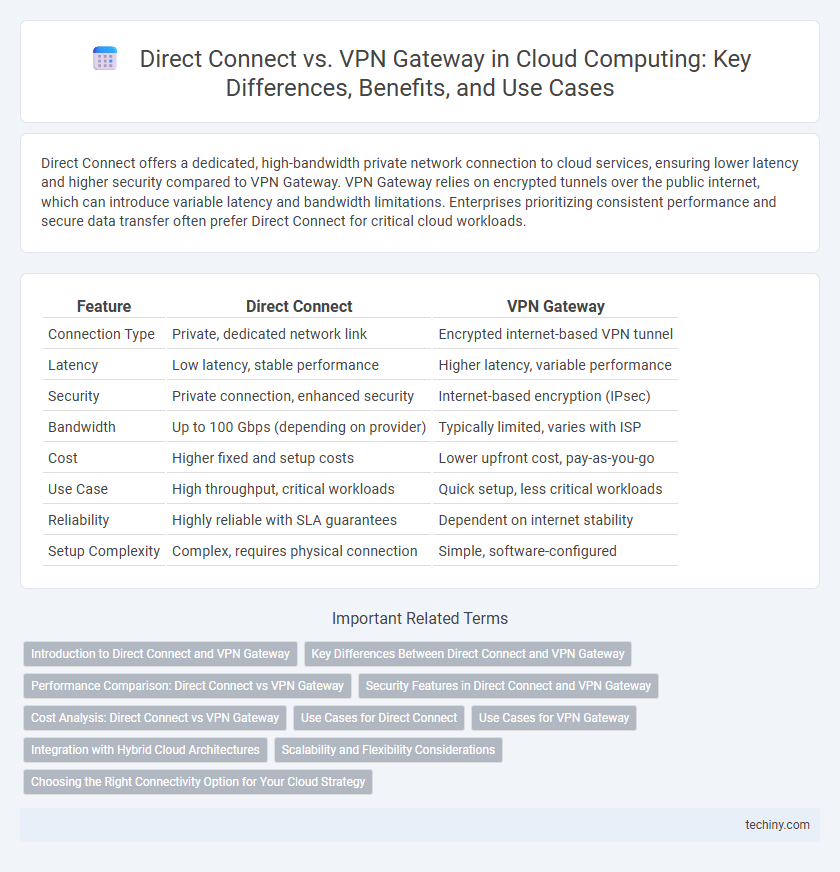Direct Connect offers a dedicated, high-bandwidth private network connection to cloud services, ensuring lower latency and higher security compared to VPN Gateway. VPN Gateway relies on encrypted tunnels over the public internet, which can introduce variable latency and bandwidth limitations. Enterprises prioritizing consistent performance and secure data transfer often prefer Direct Connect for critical cloud workloads.
Table of Comparison
| Feature | Direct Connect | VPN Gateway |
|---|---|---|
| Connection Type | Private, dedicated network link | Encrypted internet-based VPN tunnel |
| Latency | Low latency, stable performance | Higher latency, variable performance |
| Security | Private connection, enhanced security | Internet-based encryption (IPsec) |
| Bandwidth | Up to 100 Gbps (depending on provider) | Typically limited, varies with ISP |
| Cost | Higher fixed and setup costs | Lower upfront cost, pay-as-you-go |
| Use Case | High throughput, critical workloads | Quick setup, less critical workloads |
| Reliability | Highly reliable with SLA guarantees | Dependent on internet stability |
| Setup Complexity | Complex, requires physical connection | Simple, software-configured |
Introduction to Direct Connect and VPN Gateway
AWS Direct Connect provides a dedicated network connection from your on-premises data center to AWS, delivering lower latency and more consistent network performance compared to VPN Gateway, which establishes encrypted tunnels over the public internet. Direct Connect is ideal for high-throughput workloads and applications requiring stable, secure private connectivity, while VPN Gateway offers flexible, cost-effective encrypted VPN connections for hybrid cloud environments. Leveraging Direct Connect reduces internet dependency and enhances bandwidth reliability, whereas VPN Gateway prioritizes ease of setup and global accessibility.
Key Differences Between Direct Connect and VPN Gateway
Direct Connect offers a dedicated, private network connection with lower latency and higher bandwidth compared to a VPN Gateway, which uses the public internet for encrypted connections. Direct Connect ensures consistent performance crucial for large data transfers, while VPN Gateway provides more flexible, cost-effective connectivity suitable for less critical applications. Security in Direct Connect relies on physical isolation, whereas VPN Gateway leverages encryption protocols such as IPsec over the internet.
Performance Comparison: Direct Connect vs VPN Gateway
AWS Direct Connect provides dedicated network connections offering lower latency and higher throughput compared to VPN Gateway, which relies on internet-based public networks and experiences variable latency. Direct Connect achieves consistent bandwidth speeds up to 100 Gbps, making it suitable for large data transfers and real-time applications, while VPN Gateway typically maxes out at lower throughput levels due to encryption overhead and internet traffic congestion. Enterprises prioritize Direct Connect for mission-critical workloads requiring predictable performance, whereas VPN Gateway is chosen for cost-effective and flexible connectivity with moderate performance needs.
Security Features in Direct Connect and VPN Gateway
Direct Connect offers a private, dedicated network connection that enhances security by avoiding the public internet, reducing exposure to potential threats and providing consistent encryption through customer-managed controls. VPN Gateway secures data transmission over the public internet using IPsec encryption protocols, ensuring confidentiality and integrity but with potential variability in latency and exposure to internet-based risks. Both solutions integrate with cloud provider security frameworks, yet Direct Connect delivers stronger protection through isolated, point-to-point connectivity ideal for sensitive workloads.
Cost Analysis: Direct Connect vs VPN Gateway
Direct Connect offers a predictable monthly fee combined with lower per-GB data transfer costs, making it cost-effective for high-volume, consistent workloads. VPN Gateway pricing is typically based on hourly connection charges plus data transfer fees, which can escalate with increased usage and variable traffic patterns. Evaluating traffic volume and consistency is crucial for selecting between Direct Connect's fixed-cost model and VPN Gateway's usage-based pricing to optimize cloud connectivity expenditures.
Use Cases for Direct Connect
Direct Connect provides dedicated, high-bandwidth, and low-latency network connections ideal for large-scale data transfers, real-time applications, and hybrid cloud architectures requiring consistent performance. It is best suited for enterprises with stringent security compliance, high-volume workloads, or those needing stable connections for backup and disaster recovery between on-premises data centers and cloud environments. Unlike VPN Gateway, which transmits data over the public internet, Direct Connect bypasses internet congestion to ensure predictable throughput and enhanced reliability.
Use Cases for VPN Gateway
VPN Gateway is ideal for securely connecting on-premises networks to cloud environments when low-latency, high-bandwidth connections are not critical. It supports hybrid cloud architectures, enabling encrypted communication over the public internet for remote offices and mobile users. VPN Gateway is cost-effective for disaster recovery setups and workloads with moderate traffic requirements that do not necessitate dedicated connectivity.
Integration with Hybrid Cloud Architectures
Direct Connect offers dedicated, high-bandwidth connectivity with low latency, ideal for seamless integration into hybrid cloud architectures requiring consistent performance. VPN Gateway enables secure, encrypted tunnels over the public internet, providing flexibility but potentially higher latency and variable throughput. Organizations often use Direct Connect for mission-critical workloads and VPN Gateway for cost-effective, backup, or temporary hybrid cloud connections.
Scalability and Flexibility Considerations
Direct Connect offers high scalability with dedicated bandwidth options, ensuring consistent low-latency connections suitable for large-scale enterprise workloads. VPN Gateway provides greater flexibility through easy deployment across multiple regions without the need for physical infrastructure, ideal for dynamic or hybrid cloud environments. Choosing between Direct Connect and VPN Gateway depends on workload demands, connectivity consistency, and infrastructure investment priorities.
Choosing the Right Connectivity Option for Your Cloud Strategy
Selecting between AWS Direct Connect and VPN Gateway hinges on balancing performance, security, and cost for your cloud strategy. Direct Connect offers dedicated, low-latency, high-bandwidth connections ideal for data-intensive applications and hybrid architectures demanding consistent throughput. VPN Gateway provides flexible, encrypted, over-the-internet connectivity better suited for dynamic workloads and cost-sensitive environments requiring quick deployment and global reach.
Direct Connect vs VPN Gateway Infographic

 techiny.com
techiny.com